Key takeaways:
- Code reviews enhance coding skills, promote collaboration, and foster mentorship within teams.
- Establishing clear guidelines and a constructive feedback culture significantly improves the review process.
- Using the right tools, such as GitHub or CodeClimate, can streamline communication and increase efficacy in code reviews.
- Regularly scheduled review sessions lead to stronger team engagement and improved understanding of code quality.
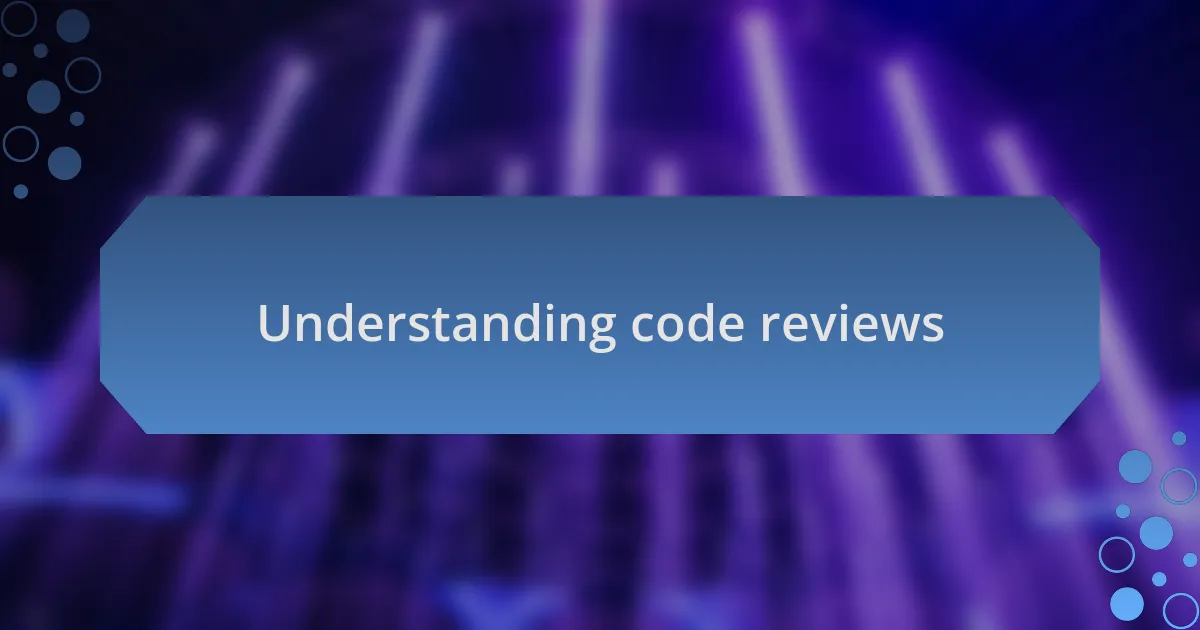
Understanding code reviews
Code reviews serve as a constructive feedback loop in the software development process. From my own experience, I’ve found that engaging in these reviews not only sharpens my coding skills but also fosters a deeper understanding of my teammates’ thought processes. Have you ever noticed how sharing your work with others can illuminate new angles or potential pitfalls you might have overlooked?
As I sift through lines of code during reviews, I often feel a mix of excitement and anxiety. It can be nerve-wracking to lay your work bare for scrutiny, but this is where real growth happens. Reflecting on my journey, I remember a time when a gentle suggestion from a peer led me to discover a more efficient way of structuring my code, completely transforming my approach to that project.
Furthermore, code reviews are more than just a necessity; they’re an opportunity for mentorship and collaboration. I’ve learned to appreciate the value of open discussions about best practices and varying perspectives. Isn’t it fascinating how a single code snippet can spark a lively debate on functionality, readability, or performance? Those conversations have stayed with me, enriching my understanding and encouraging me to strive for excellence in my coding endeavors.
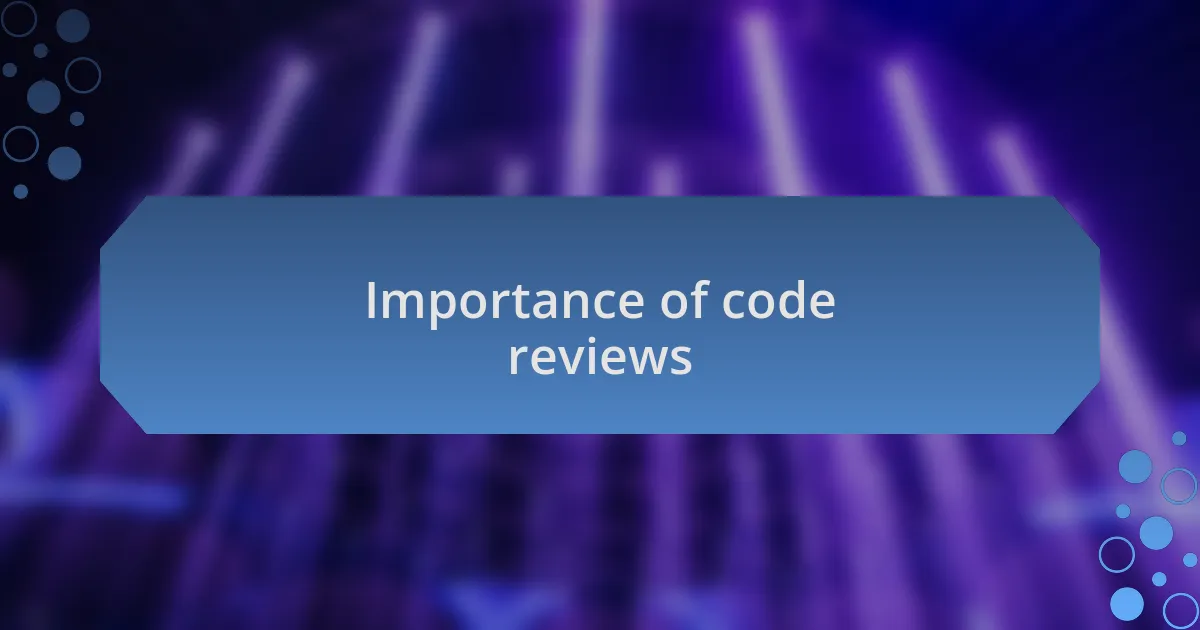
Importance of code reviews
Code reviews play a crucial role in maintaining code quality and fostering a culture of collaboration. I’ve experienced firsthand how a thorough review can catch subtle bugs that might otherwise slip through the cracks. This not only saves time in the long run but also strengthens the final product. Have you ever stared at your code for so long that you become blind to its flaws? That’s where a fresh pair of eyes can make all the difference.
Additionally, the importance of code reviews extends beyond just code correction. I remember my first experience participating in a review process where I witnessed veterans sharing their insights. Their discussions often transformed my understanding of coding conventions and design principles. This exchange not only enhanced my skills but ignited a passion for continuous learning. Isn’t there something empowering about knowing that your work contributes to a larger conversation about best practices?
Finally, code reviews can foster team cohesion, which is essential in a collaborative environment. Engaging in these reviews has created bonds among team members, as we learn to trust one another’s expertise. I often look forward to our review sessions, aware that they provide us with a unique platform to celebrate wins and work through challenges together. How often do you have the chance to deepen your professional relationships while honing your craft? It’s a blend of support and accountability that I’ve found invaluable in my career.
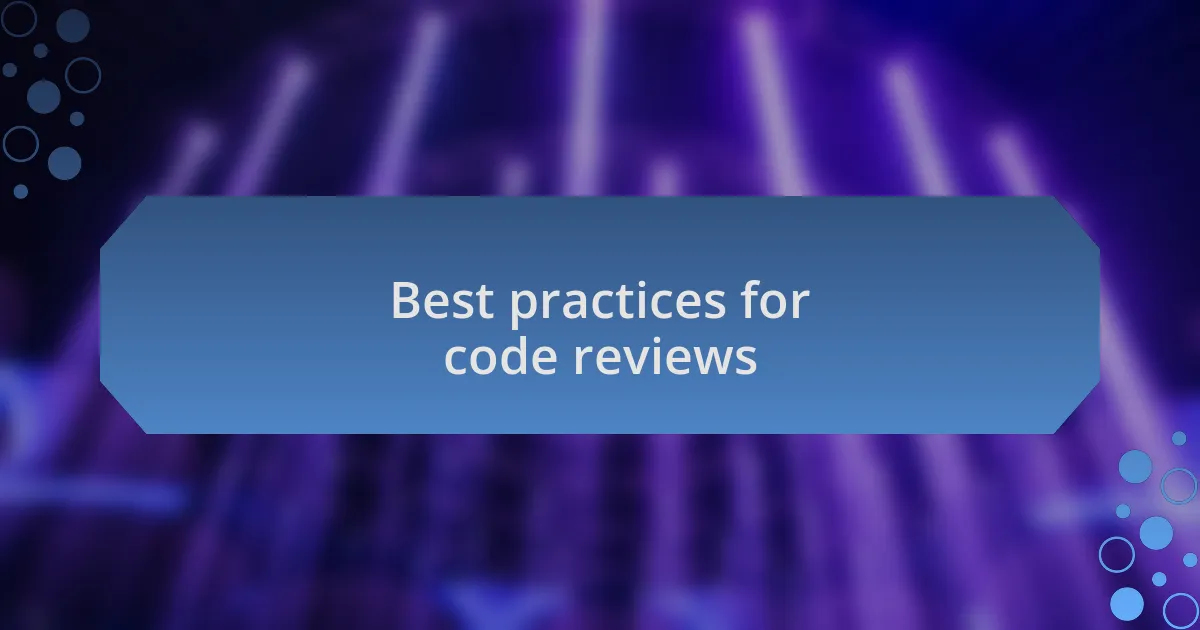
Best practices for code reviews
When conducting code reviews, it’s vital to establish clear guidelines beforehand. From my experience, setting expectations around what aspects to focus on—such as readability, performance, and adherence to coding standards—can streamline the process immensely. I still recall a project where ambiguity led to misaligned feedback, which only frustrated the team. Doesn’t it make sense to have a shared understanding from the get-go?
Another effective practice is to approach the review with a constructive mindset. I’ve seen how positive language can transform the tone of feedback, making it feel collaborative rather than critical. For example, instead of simply pointing out what’s wrong, I began framing my suggestions as opportunities for improvement. This shift empowered my peers and encouraged an open dialogue. Have you ever noticed how a simple rephrasing can change the entire atmosphere of a discussion?
Lastly, I’ve found that timing your reviews can significantly impact their effectiveness. Regular, timely reviews—ideally, right after a piece of code is written—help maintain momentum and keep issues fresh in the mind of both the reviewer and the author. I remember a project that stalled because we delayed reviews until the end. That not only led to a bottleneck in progress but also diminished the opportunity for immediate learning. Wouldn’t it feel more productive to catch issues early when they’re still fresh?
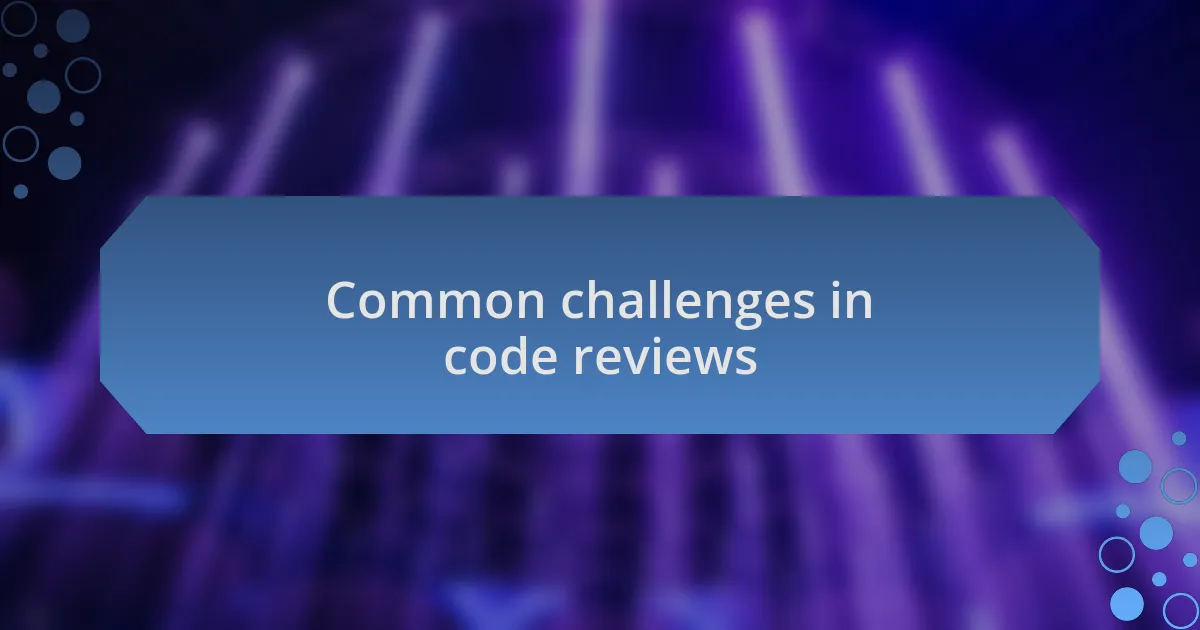
Common challenges in code reviews
When it comes to code reviews, one common challenge I’ve encountered is the sheer volume of information that needs to be processed. I remember a particularly intense review session where my eyes glazed over just trying to absorb every detail. When facing extensive code changes, it’s easy to feel overwhelmed, and that can lead to missing critical issues. Do you ever feel the same way when the code just seems to pile up?
Another obstacle is differing perspectives on what constitutes “clean” code. I once worked with a colleague whose style was vastly different from mine, leading to endless debates on best practices. While these discussions can be enlightening, they also risk derailing the review process if not managed well. Have you experienced a similar clash of coding philosophies that sent your reviews spiraling into lengthy arguments?
Moreover, emotional responses can pose challenges during reviews. There have been times when I made a suggestion, only to see the recipient become defensive or frustrated. I learned that acknowledging the emotional weight of feedback can foster a more supportive environment. Have you found that a little empathy during feedback can go a long way in smoothing out tensions?
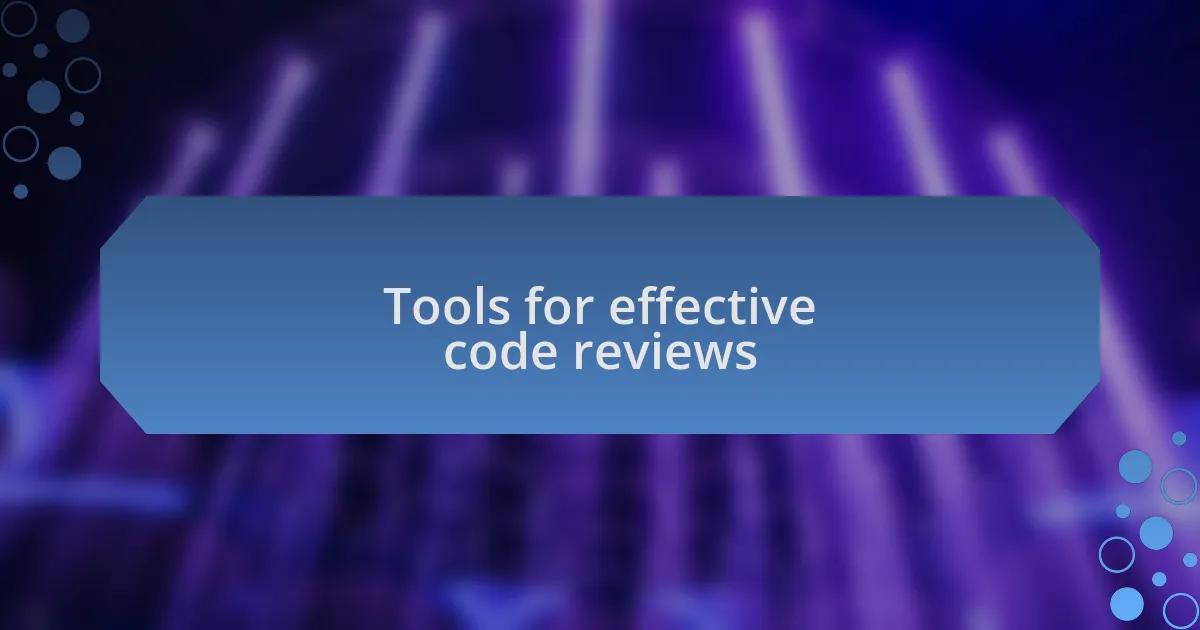
Tools for effective code reviews
Effective code reviews can greatly benefit from the right tools. For instance, I’ve found that using platforms like GitHub or Bitbucket simplifies collaboration and streamlines the review process. The ability to comment directly on lines of code fosters a more conversational and constructive dialogue. What tools do you rely on for your reviews?
One tool that caught my attention recently is CodeClimate, which provides a clear view of code quality metrics. I remember when I first integrated it into my workflow; it highlighted areas I had overlooked in my reviews before. Seeing those insights made me realize that objective metrics can balance subjective opinions, helping to keep discussions focused and productive. Have you ever used metrics to support your reviews?
Additionally, I value tools like Review Board that offer customizable workflows tailored to your team’s needs. I utilized a specific workflow feature that prompted reviewers to check for critical checklist items before submitting feedback. This small adjustment ensured consistency and accountability, giving everyone confidence that thorough reviews were taking place. Have you discovered any workflow tweaks that made a significant difference in your code reviews?
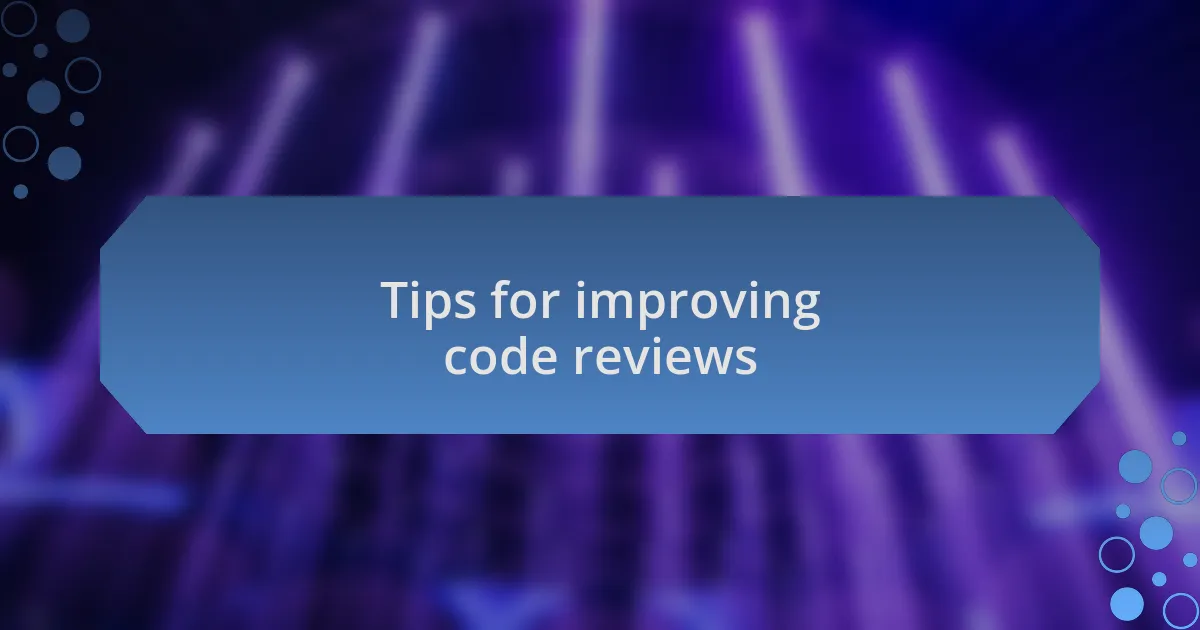
Tips for improving code reviews
One straightforward tip I’ve found effective is to establish clear guidelines for code reviews. When I started implementing a checklist for reviewers, it transformed the process. I still remember how much smoother our reviews became; it not only set expectations but also minimized the anxiety some reviewers felt about missing critical points. Have you ever noticed how much clarity can improve a team’s productivity?
Another approach that boosted my reviews was fostering a culture of constructive feedback. Early in my career, I experienced the difference when a colleague provided feedback in a supportive manner rather than being overly critical. It inspired me to adopt the same approach. Now, I often encourage my team to balance their critiques with positive observations. Doesn’t it make sense that people learn better in a supportive environment?
Lastly, scheduling regular review sessions turned out to be a game changer. At first, I was skeptical when my team suggested this. However, after committing to a set time each week, we’ve seen a marked improvement in team engagement. It creates an opportunity for open discussion, and I’ve found that being prepared fosters a deeper understanding of our code. What scheduling practices have you tried that encouraged active participation?